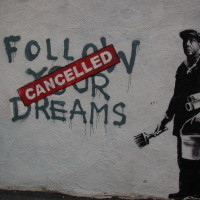What does community mean to you? What are the most important aspects of a community? In this Stanford Social Innovation Review article, David Chavis and Kien Lee discuss many of the elements that are key to community: location, meeting common needs, a sense of safety and belonging, and a shared history. They also point out the complex nature of communities: "When a funder or evaluator looks at a neighborhood, they often struggle with its boundaries, as if streets can bind social relationships. Often they see a neighborhood as the … [Read more...]
Language Matters
Once a year, NAS gathers 24 creative changemakers from all over the nation for a week-long residential program called Creative Community House. We spend this week living and learning alongside each other, sharing ideas and experiences and chewing on new information presented by NAS and our partners. And we also debate with each other. A lot. One of the most enlightening debates we had at last year’s Creative Community House was around language. The words some brought into conversations in hopes that they would offer clarity ended up … [Read more...]
You’re Among the Greats
The next time you fail, you will know that you are never alone. You’re among creative individuals like Toni Morrison, Perry Chen, Sarah Kaufman and countless others. Take a look at this amazing issue of NEA Arts Magazine on “The Art of Failure.” As we have illustrated on Field Notes this week, it is an art, one that you can practice and eventually (sort of) master. Remember to reflect, learn, and lead through failure. We'll be tuning back in next week with failure stories from the field. Don't miss it. “Ever tried. Ever failed. No matter. … [Read more...]
Being a Team Leader
Failing sucks. It can be a difficult time of navigating emotions, goals, and setbacks. Now, picture how much more difficult it is to guide others through a failure. We're sure that many of you don't have to let your imagination run too wild. You've probably been there. This is something leaders do constantly. Leading a team through failure is more difficult than a single individual, as different people have different reactions. This Harvard Business Review article gives clear instructions and motivations for leaders to help guide their teams … [Read more...]
A Design Thinking Frame of Mind
When you’re watching things go down in flames or they've just collapsed in front of you, it can be hard to keep a broad perspective and focus on moving forward productively. This article by Miriam Persley at Leadership Learning Community (which references Beth Kanter from our post yesterday as inspiration) provides a twist on a design thinking framework to give us a practical list for working through failure, in a healthy way: Gain Empathy: Reflect Gain Empathy: Dig Deeper Reframe: Infer Insights Reframe: Set A … [Read more...]
C’mon Celebrate!
Even when you’re in the middle of a sticky situation, it’s possible to find the humor in your predicament and change perspective. Although not all failures are productive, in fact, we’d reason to say that none of them are necessarily productive, there is still reason to celebrate! Writer Gwen Moran shares in Fast Company that by responding to failure with empathy and humor, you can foster a creative culture. Even if a setback gets you down, Gwen shares that it’s important to encourage a supportive environment at work to build trust and turn … [Read more...]
On Failure and Fun
In this video, Beth Kanter, discusses the prominent resistance to using failure in the nonprofit sector to our benefit or as a learning mechanism. It is helpful to move out of a ‘fixed’ mindset into a ‘growth’ mindset in order to use failure in a productive way. Rather than fixating on a tough situation, think about it in terms of growth! By being open to growth and change, you can use failure as an opportunity to improve. It takes some practice to get into this mindset though. Our first reactions to failure are typically negative. Beth … [Read more...]
When You Might Want to Worry
It’s day four of our journey in the land of failure. To date, the news has been fairly positive, if not supportive. It has focused on the celebration, the motivation. As with everything in life, it is important to balance the bad with the good. Moderate your acceptance of failure with the knowledge that not all failure is good. This article in the Harvard Business Review by Art Markman makes this important distinction between a ‘good’ failure and a ‘bad’ failure. Occasional failure is ok, but systematic failure means you have a real problem. … [Read more...]
Sharing is Caring.
People tend to talk more frequently about their successes, rather than their failures. This is natural, but it can make you feel awfully small when you think you’re the only one in the room who has failed. FuckUpNights is an organization that hosts events in cities around the world where individuals from all industries meet to share stories about their failures and then welcome questions and conversation. In addition to removing the shame from failure, this organization helps you learn from it. They also host a failure institute and have … [Read more...]
It’s a Shark.
Have you heard the saying "a few sharks can ruin the sea"? Probably not. It’s not an actual saying. Perhaps it should be. Have you ever wanted to take a chance on a new idea or project but found yourself hesitating? Why? It could be because you realize there is a chance it might fail, so you find yourself afraid to follow through. Our friend, Beck Tench, writes often about failure. About confronting it, admitting it and defining it. On her blog, she offers a "flow chart for fear" to help you better understand its root. The fear of failure … [Read more...]
Setting Intention
"One great lesson we learn when we mess up is how to set intention." In this Forbes article, Liz Ryan highlights this as one of the great take-a-ways from a big failure. Ryan notes that after making a mistake, creative leaders have the opportunity to set intention. I believe we have this opportunity as we venture into any task. Each morning during the Creative Community House, a cornerstone component to the Creative Community Fellows program, we begin the day by setting intention together. Each day has a theme, a theme that the day's content … [Read more...]
Complex Problem? Fail your way to a solution.
Like Ed Catmull of Pixar states, failure is necessary to producing successful creative work. If only because the first idea is not always the best idea. It requires reworking, shapeshifting. In this article, Financial Times columnist Tim Harford provides principles that you can use to accomplish this so-called ‘productive failure’: 1. “You have to cast a wide net” 2. “’Practice failing” in a safe space’” 3. “Be primed to let go of your idea if you’ve missed the mark” We've seen over past two days that folks continue to come back to: … [Read more...]
The Story Behind Toy Story
Why are Pixar’s movies such a huge success? Creative successes might be more related to failure than you think. In this article on his book, Creativity Inc., Ed Catmull, President of Pixar Animation and Disney Animation shares his insight on managing a creative organization that thrives on innovation and embracing new ideas. In order to be truly open to new ideas, he argues, organizations must have a culture of trust. “The antidote to fear is trust, and we all have a desire to find something to trust in an uncertain world. Fear and trust … [Read more...]
10 Reasons We Fail
There are a myriad of reasons that we fail, from plain bad luck to miscommunication or organizational shortcomings. In this article, entrepreneur Caroline Cummings, offers a set of ten reasons why many of the startups she's seen throughout her career, failed. Her observations reflect much of what we have seen and heard from our colleagues in the Creative Community Fellows program. They touch on team building, audience research and change. Caroline’s list leaves us thinking about what failure can teach us about success. Have you experienced … [Read more...]
Fail Better
Best selling author, Seth Godin shares what we all know to be true, we all fail. So, how do we make the most of it? If you’re going to fail, you should fail in the best way possible, right? We can’t control what external events occur, but we can control our reactions to setbacks and failures. Seth offers six ways to help us fail better and with intention: Whenever possible, take on specific projects. Make detailed promises about what success looks like and when it will occur. Engage others in your projects. If you … [Read more...]















